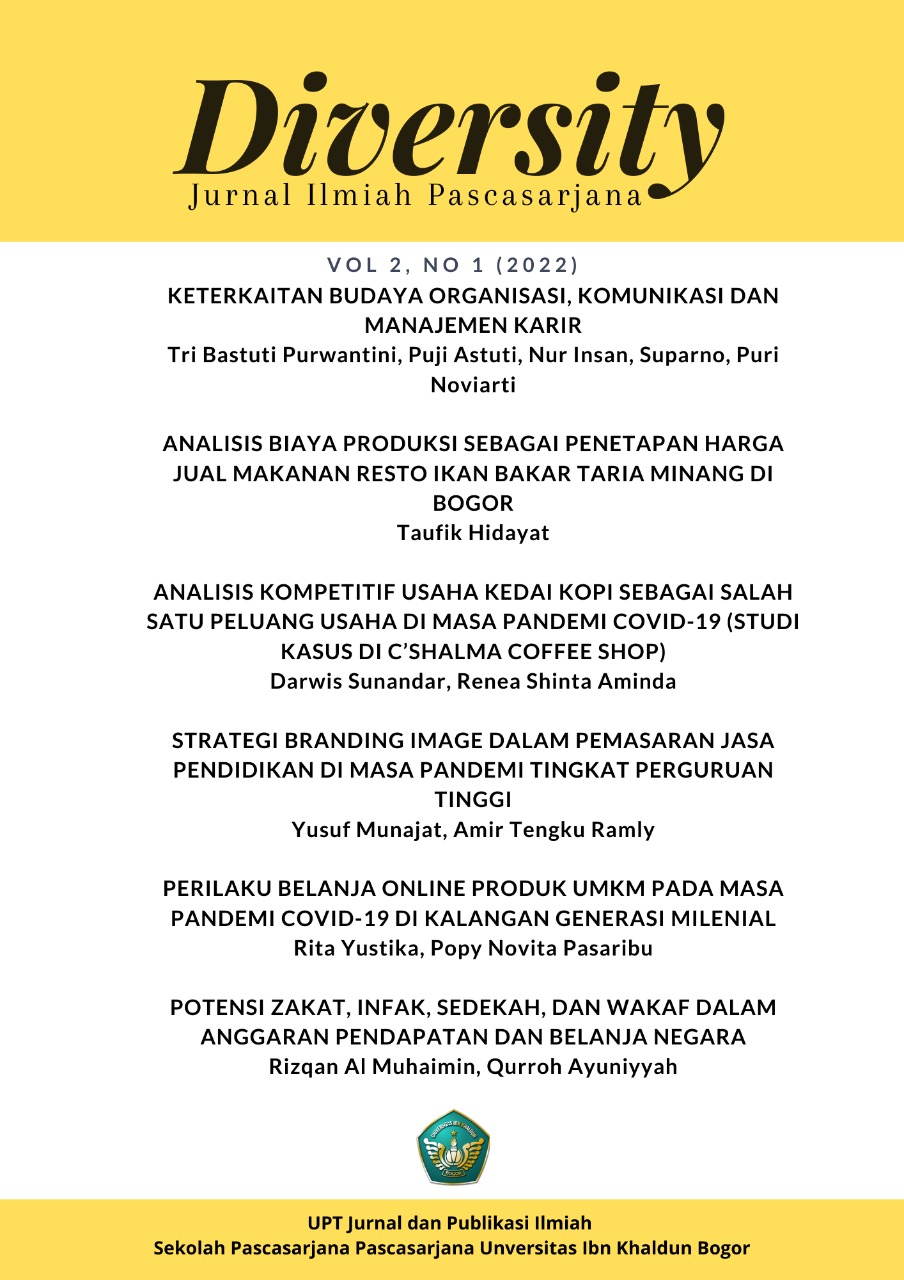Keterkaitan Budaya Organisasi, Komunikasi dan Manajemen Karir
DOI:
https://doi.org/10.32832/djip-uika.v2i1.3975Abstract
Organizational culture is an organizational model that regulates values and norms, while communication contains cultural values. These two variables are interrelated and affect individual activities and career success in an organization. This study aims to analyze the relationship between culture, communication, and career management. The method is a literature study with information data analysis using qualitative descriptive analysis. The results showed that culture and communication have a positive reciprocal relationship. Culture affects communication and conversely, communication affects culture. This means that communication and culture are interconnected concepts. Between cultural variables, communication within the organization will synergize in developing work activities to achieve career success and support organizational goals. Organizational communication culture and work motivation simultaneously affect employee performance. Meanwhile, organizational culture and career development simultaneously affect employee performance. The better the organizational culture, the better the employee's performance, and vice versa. The influence of career development variables on employee performance is positive, if career development increases, employee performance will increase, and vice versa. Therefore, improving employee performance can be influenced by culture and career development. Thus competence and an effective communication model with strong organizational culture can improve employee performance and success and expected to support organizational goals.
References
Akhmal, A., Laia, F., & Sari, R. A. (2018). Pengaruh pengembangan karir terhadap kepuasan kerja karyawan. Jurnal Bis-A: Jurnal Bisnis Administrasi, 7(1), 20-24.
Berko, R., Wolvin, A., Wolvin, D. R., & Aitken, J. E. (2016). Communicating: A social, career, and cultural focus. Routledge.
Clampitt, P. G. (2016). Communicating for Managerial Effectiveness: Challenges| Strategies| Solutions. SAGE Publications
Didit, A.T. (2015). Pengaruh Iklim Komunikasi dan Budaya Organisasi Terhadap Motivasi Kerja Pegawai (Studi di Politeknik Negeri Semarang). Thesis S2. Fakultas Ilmu Sosial Dan Ilmu Politik Universitas Diponegoro. Semarang.
Deal, T. E., & Kennedy, A. A. (2008). The new corporate cultures: Revitalizing the workplace after downsizing, mergers, and reengineering. Basic Books.
Dwi, A. 2020. 9 Cara Jitu Meningkatkan Keterampilan Berkomunikasi Anda. Diakses dari https://www.duniakaryawan.com/cara-meningkatkan-keterampilan-berkomunikasi/
Faisal, M. (2016). Hubungan Budaya Komunikasi Organisasi dan Motivasi Kerja Terhadap Kinerja Pegawai di Lingkungan Sekretariat Daerah Kabupaten Langkat. Jurnal Simbolika 2(2), 167-180. Diakses dari http://ojs.uma.ac.id/index.php/simbolika/article/view/1028/1034
Gibson, J. L., Ivancevich, H. M., & Donnelly, J. H. (2006). Organizations: Behavior-structure-process Plano: Business Publication
Hardiyana, A. (2015). Strategi Pengembangan Karir Dan Budaya Organisasi. Majalah Bisnis Dan IPTEK, 8(1), 18-25. Diakses dari https://core.ac.uk/download/pdf/234663582.pdf
Lasmahadi, A. (2017). Mengapa manajemen karir penting untuk kita? Apa kegunaan dan manfaatnya? Diakses dari https://psyline.id/manajemen-karir/
Mondy, R. W. (2010), Manajemen Sumber Daya Manusia, Jakarta: Penerbit Erlangga
Muchtar, K, Koswara, I. & Setiaman , A. (2016). Komunikasi Antar Budaya dalam Perspektif Antropologi Jurnal Manajemen Komunikasi 1(1).
Nugraha, R & Rozak, D.A. (2017). Pengaruh Budaya Organisasi dan Pengembangan Karir terhadap Kepuasan Kerja Karyawan: Studi Persepsional Pada Karyawan PT. Bank Bukopin Cabang Tasikmalaya. Journal of Management Review 1(1) Diakses dari https://jurnal.unigal.ac.id/index.php/managementreview/article/view/510
Ramly, A. T. (2021). Manajemen Kinerja Sumber Daya Manusia. GCAINDO.
Rivai, V. (2009). Manajemen Sumber Daya Manusia Untuk Perusahaan. Raja Grafindo Persada, Jakarta
Rivai, V. dan Sagala, E.J.. (2009). Manajemen Sumber Daya Manusia untuk Perusahaan dari Teori ke Praktik. PT Raja Grafindo, Jakarta,
Robbins, S.P. (2006). Perilaku organisasi. Edisi Bahasa Indonesia. PT Indeks. Jakarta
Romadona, M.R., & Setiawan, S. (2019). Impact of communication in organization to readiness for change: Case of research organization X. SU-AFBE 2018, Proceeding of the 1st Sampoerna UniversityAFBE International Conference. Retrieved from doi: 10.4108/eai.6- 12-2018.2286327
Romadona, M. R., & Setiawan, S. (2020). Komunikasi Organisasi dalam Fenomena Perubahan Organisasi di Lembaga Penelitian dan Pengembangan Communication of Organizations in Organizations Change's Phenomenon in Research and Development Institution. Jurnal Pekommas, 5(1), 91-104. Diakses dari https://core.ac.uk/download/pdf/304721882.pdf
Satria, K., Waluyo, H. D., & Widiartanto, W. (2015). Pengaruh Budaya Organisasi, Pengembangan Karir dan Kompensasi terhadap Kinerja Karyawan Bagian Pemasaran PT. Nyonya Meneer Semarang. Jurnal Ilmu Administrasi Bisnis, 4(4), 90-98.
Schein, 2009, Organizational Culture and Leadership, Josey Bass, San Fransisco.
Sumaki, WJ. Taroreh,& R.N. Soepeno,D. (2015). Pengaruh Disiplin Kerja, Budaya Organisasi, dan Komunikasi Terhadap Kinerja Karyawan PT. PLN (Persero) Wilayah Suluttenggo Area Manado. Jurnal Berkala Ilmiah Efisiensi, 15(5). 1232-1242
Tika, Pabundu, 2006, Budaya Organisasi dan Peningkatan Kinerja Perusahaan,Bumi Aksara Jakarta.
Tubbs, S.L & Moss. (2005). Human Communication: Konteks-Konteks Komunikasi. penerjemah, Mulyana,D. Gembirasari; Editor Mulyana, D. Remaja Rosdakarya, Bandung
Tuzun, I. K. (2013). Organizational levels of analysis of communication satisfaction and identification in relation to job satisfaction. Journal of Economics, Business and Management, 1(1), 1-5. Diakses dari DOI: 10.7763/JOEBM.2013.V1.1







